跨文化交际unit1~6课后translation中英对照
跨文化交际-unit1-6-课后translation中英对照

跨文化交际-unit1-6-课后translation中英对照Unit 1 Page 22The growth of intercultural communication as a field of study is based on a view of hi story that clearly demonstrates people and cultures have been troubled by a persistent i nability to understand and get along with groups and societies removed by space, ideol ogy, appearance, and behavior from their own. What is intriguing about many of huma n civilization's failure is that they appear to be personal as well as global. The story of h umankind is punctuated with instances of face-to-face conflicts as well as international misunderstanding--major and minor quarrels that range from simple name-calling to i solationism or even armed conflict.It is obvious that increased contact with other cultures and subcultures makes it impe rative for us to make a concerted effort to get along with and to try to understand peop le whose beliefs and backgrounds may be vastly different from our own. The ability, thr ough increased awareness and understanding, to peacefully coexist with people who do not necessarily share our lifestyles or values could benefit us not only in our own neigh borhoods but could be the decisive factor in maintaining world peace.纵观历史,我们可以清楚地看到,人们由于彼此所处地域、意识形态、容貌服饰和行为举止上存在的差异,而长久无法互相理解、无法和睦相处。
跨文化商务交际英语unit 1 text1-Culture and communication参考译文(英汉对照版彭炳铭)

Text 1 Culture and Communication 文化与交际(翻译官:彭炳铭2019.9.20.)Paragraph 1.The term “culture” comes from anthropologists’ studies of human societies. 文化这一术语出自人类学家对人类社会的研究。
Culture is the particular configuration of behaviors, norms, attitudes, values, beliefs and basic assumptions that differ from society to society .文化是由特定行为、道德规范、态度、价值观、信仰、和基本假说等要素构成,这些要素因社会不同而不同。
This means that culture is not “objective” in the sense that phenomena in the natural world are (or seem to be ) objective.意思是:大自然的现象都是客观的,在这个意义上讲,文化就不是“客观的”。
Culture can look different depending upon who does the looking, when they look and from what direction.1/ 20文化看起来是不同的,这有赖于谁在看、何时看、从什么方向(角度)来看。
This makes culture difficult to grasp. 这就使得文化很难掌握。
Paragraph 2.Culture has been defined in many ways but a classic definition is : 文化的定义是多方面的,但有一个经典的定义是:Culture consists of patterns, explicit and implicit, of and for behavior, acquired and transmitted by symbols, constituting the distinctive achievements of human groups … the essential core of culture consists of traditional ideas and especially their attached values.”【译文】文化包含各种外显和内隐的行为模式,这些行为模式通过符号习得和传播,构成了人类群体与众不同的成就。
大学跨文化英语 综合教程I Unit 6 Making Sense of China课文翻译
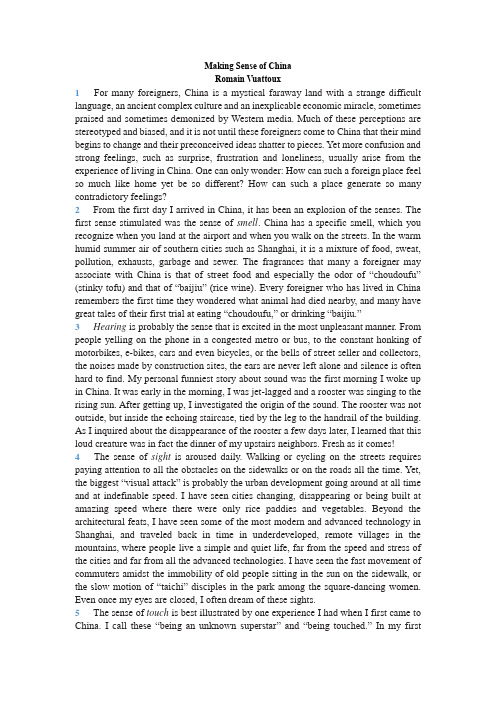
Making Sense of ChinaRomain Vuattoux1 For many foreigners, China is a mystical faraway land with a strange difficult language, an ancient complex culture and an inexplicable economic miracle, sometimes praised and sometimes demonized by Western media.Much of these perceptions are stereotyped and biased, and it is not until these foreigners come to China that their mind begins to change and their preconceived ideas shatter to pieces. Yet more confusion and strong feelings, such as surprise, frustration and loneliness, usually arise from the experience of living in China. One can only wonder: How can such a foreign place feel so much like home yet be so diff erent? How can such a place generate so many contradictory feelings?2 From the first day I arrived in China, it has been an explosion of the senses. The first sense stimulated was the sense of smell. China has a specific smell, which you recognize when you land at the airport and when you walk on the streets. In the warm humid summer air of southern cities such as Shanghai, it is a mixture of food, sweat, pollution, exhausts, garbage and sewer. The fragrances that many a foreigner may associate with China is that of street food and especially the odor of “choudoufu” (stinky tofu)and that of “baijiu” (rice wine). Every foreigner who has lived in China remembers the first time they wondered what animal had died nearby, and many have great tales of their fi rst trial at eating “choudoufu,” or drinking“baijiu.”3 Hearing is probably the sense that is excited in the most unpleasant manner. From people yelling on the phone in a congested metro or bus, to the constant honking of motorbikes, e-bikes, cars and even bicycles, or the bells of street seller and collectors, the noises made by construction sites,the ears are never left alone and silence is often hard to find. My personal funniest story about sound was the first morning I woke up in China. It was early in the morning, I was jet-lagged and a rooster was singing to the rising sun. After getting up, I investigated the origin of the sound. The rooster was not outside, but inside the echoing staircase, tied by the leg to the handrail of the building. As I inquired about the disappearance of the rooster a few days later, I learned that this loud creature was in fact the dinner of my upstairs neighbors. Fresh as it comes!4 The sense of sight is aroused daily. Walking or cycling on the streets requires paying attention to all the obstacles on the sidewalks or on the roads all the time. Yet, the bigge st “visual attack” is probably the urban development going around at all time and at indefinable speed. I have seen cities changing, disappearing or being built at amazing speed where there were only rice paddies and vegetables. Beyond the architectural feats, I have seen some of the most modern and advanced technology in Shanghai, and traveled back in time in underdeveloped, remote villages in the mountains,where people live a simple and quiet life, far from the speed and stress of the cities and far from all the advanced technologies. I have seen the fast movement of commuters amidst the immobility of old people sitting in the sun on the sidewalk, or the slow motion of “taichi” disciples in the park among the square-dancing women. Even once my eyes are closed, I often dream of these sights.5 The sense of touch is best illustrated by one experience I had when I first came to China. I call these “being an unknown superstar” and “being touched.” In my f irsteducational establishment, I sometimes had to teach in another campus on the other side of town. I would ride my bicycle across town to get to class, and it often felt like being in a movie. All the kids and adults stared and pointed to the “laowai” (foreigner) on his bicycle. As I took an excursion in the “deep” countryside, many people would approach me while I was buying some water or some snack and would start touching the hair on my arms.6 For foreigners as for Chinese, the most important sense is the sense of taste. It is also certainly the one that provides the most pleasure and the base of many relationships.I have been invited to many meals and took part in ceremonial drinking. I have seen food displays that are as elaborate as their tastes. Thousand-year-old eggs, snake, turtle, dumplings, bamboo,lotus root, pigs ears, lacquered ducks, duck neck and head, chicken feet,spicy fish head, the hundreds of ways of eating tofu are just some of the dishes that one discovers and appreciates. A lifetime would never suffice to try to taste all the specialties in China.7 Orderly chaos, disorganized order, old and new, beautiful and filthy,clean and dirty, rich and poor, kindness and arrogance ... All are opposed sensations and situations living together, side by side. For me, China is a collision of feelings, a juxtaposition of experiences and perceptions that are usually contradictory. China is all these contradictions and diversity that somehow manage to live together almost harmoniously.参考译文解读中国罗曼·瓦图对于很多外国人而言,中国是一个遥远而神秘的国度,有着奇特难懂的语言,古老深奥的文化,以及难以解释的经济奇迹,时而被西方媒体戴高帽,时而被他们妖魔化。
【VIP专享】跨文化交际 unit1~6 课后translation中英对照

Unit 1 Page 22The growth of intercultural communication as a field of study is based on a view o f history that clearly demonstrates people and cultures have been troubled by a pers istent inability to understand and get along with groups and societies removed by sp ace, ideology, appearance, and behavior from their own. What is intriguing about m any of human civilization's failure is that they appear to be personal as well as globa l. The story of humankind is punctuated with instances of face-to-face conflicts as well as international misunderstanding--major and minor quarrels that range from simple name-calling to isolationism or even armed conflict.It is obvious that increased contact with other cultures and subcultures makes it i mperative for us to make a concerted effort to get along with and to try to understa nd people whose beliefs and backgrounds may be vastly different from our own. Th e ability, through increased awareness and understanding, to peacefully coexist with people who do not necessarily share our lifestyles or values could benefit us not only in our own neighborhoods but could be the decisive factor in maintaining world pea ce.纵观历史,我们可以清楚地看到,人们由于彼此所处地域、意识形态、容貌服饰和行为举止上存在的差异,而长久无法互相理解、无法和睦相处。
跨文化交际英语阅读教程所学课文翻译
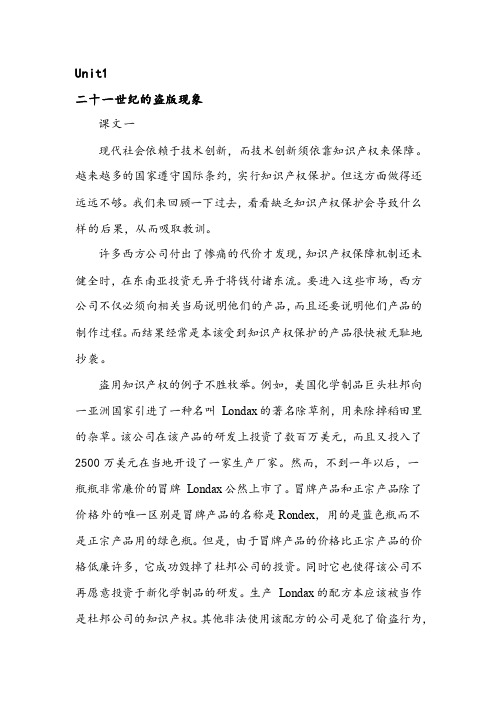
Unit1二十一世纪的盗版现象课文一现代社会依赖于技术创新,而技术创新须依靠知识产权来保障。
越来越多的国家遵守国际条约,实行知识产权保护。
但这方面做得还远远不够。
我们来回顾一下过去,看看缺乏知识产权保护会导致什么样的后果,从而吸取教训。
许多西方公司付出了惨痛的代价才发现,知识产权保障机制还未健全时,在东南亚投资无异于将钱付诸东流。
要进入这些市场,西方公司不仅必须向相关当局说明他们的产品,而且还要说明他们产品的制作过程。
而结果经常是本该受到知识产权保护的产品很快被无耻地抄袭。
盗用知识产权的例子不胜枚举。
例如,美国化学制品巨头杜邦向一亚洲国家引进了一种名叫Londax的著名除草剂,用来除掉稻田里的杂草。
该公司在该产品的研发上投资了数百万美元,而且又投入了2500万美元在当地开设了一家生产厂家。
然而,不到一年以后,一瓶瓶非常廉价的冒牌Londax公然上市了。
冒牌产品和正宗产品除了价格外的唯一区别是冒牌产品的名称是Rondex,用的是蓝色瓶而不是正宗产品用的绿色瓶。
但是,由于冒牌产品的价格比正宗产品的价格低廉许多,它成功毁掉了杜邦公司的投资。
同时它也使得该公司不再愿意投资于新化学制品的研发。
生产Londax的配方本应该被当作是杜邦公司的知识产权。
其他非法使用该配方的公司是犯了偷盗行为,就像盗取了杜邦公司的机器或者该公司的其他财产一样。
不光是产品,在亚洲市场上保护一个品牌也曾经是几乎不可能的事。
就连Kellogg’s玉米片的生产商Kellogg’s公司也发现自己的产品被山寨:Kongal 牌玉米条,连包装也几乎一模一样。
不幸的是,和杜邦公司的事件一样,Kellogg’s 公司成功惩罚侵权者的几率几乎为零,因为当地的法律不承认知识产权保护的概念。
幸好,在经过许多轮世贸组织的谈判后,情况大为改观。
然而,跨国公司必须保持警惕,以防被侵权。
总有人试图从别人的研发、投资、商誉中牟利。
如果成果得不到法律保护,创新就是空话。
跨文化交际第三册参考答案-unit1-中翻英
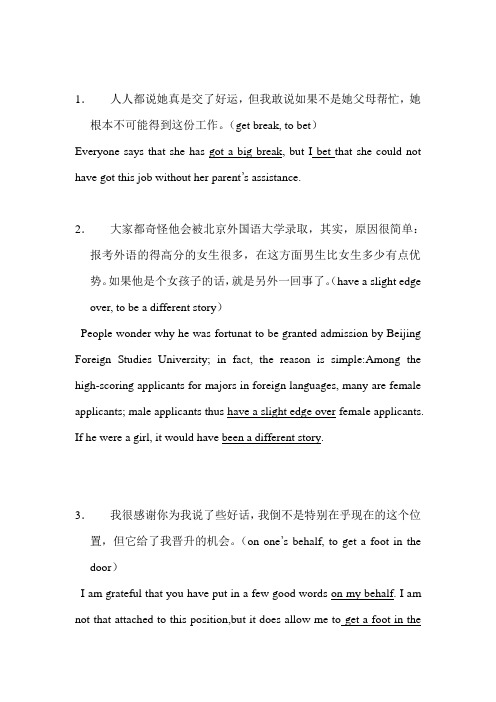
1.人人都说她真是交了好运,但我敢说如果不是她父母帮忙,她根本不可能得到这份工作。
(get break, to bet)Everyone says that she has got a big break, but I bet that she could not have got this job without her parent’s assistance.2.大家都奇怪他会被北京外国语大学录取,其实,原因很简单:报考外语的得高分的女生很多,在这方面男生比女生多少有点优势。
如果他是个女孩子的话,就是另外一回事了。
(have a slight edge over, to be a different story)People wonder why he was fortunat to be granted admission by Beijing Foreign Studies University; in fact, the reason is simple:Among the high-scoring applicants for majors in foreign languages, many are female applicants; male applicants thus have a slight edge over female applicants. If he were a girl, it would have been a different story.3.我很感谢你为我说了些好话,我倒不是特别在乎现在的这个位置,但它给了我晋升的机会。
(on one’s behalf, to get a foot in the door)I am grateful that you have put in a few good words on my behalf. I am not that attached to this position,but it does allow me to get a foot in thedoor of promotion.4.作为公司的员工你必须遵守公司的各项规定。
新编跨文化交际英语教程1-10单元翻译
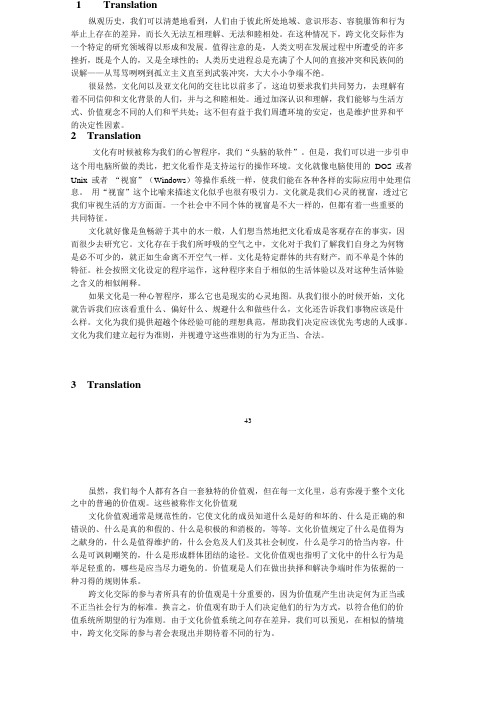
1 Translation纵观历史,我们可以清楚地看到,人们由于彼此所处地域、意识形态、容貌服饰和行为举止上存在的差异,而长久无法互相理解、无法和睦相处。
在这种情况下,跨文化交际作为一个特定的研究领域得以形成和发展。
值得注意的是,人类文明在发展过程中所遭受的许多挫折,既是个人的,又是全球性的;人类历史进程总是充满了个人间的直接冲突和民族间的误解——从骂骂咧咧到孤立主义直至到武装冲突,大大小小争端不绝。
很显然,文化间以及亚文化间的交往比以前多了,这迫切要求我们共同努力,去理解有着不同信仰和文化背景的人们,并与之和睦相处。
通过加深认识和理解,我们能够与生活方式、价值观念不同的人们和平共处;这不但有益于我们周遭环境的安定,也是维护世界和平的决定性因素。
2 Translation文化有时候被称为我们的心智程序,我们“头脑的软件”。
但是,我们可以进一步引申这个用电脑所做的类比,把文化看作是支持运行的操作环境。
文化就像电脑使用的DOS或者Unix或者“视窗”(Windows)等操作系统一样,使我们能在各种各样的实际应用中处理信息。
用“视窗”这个比喻来描述文化似乎也很有吸引力。
文化就是我们心灵的视窗,透过它我们审视生活的方方面面。
一个社会中不同个体的视窗是不大一样的,但都有着一些重要的共同特征。
文化就好像是鱼畅游于其中的水一般,人们想当然地把文化看成是客观存在的事实,因而很少去研究它。
文化存在于我们所呼吸的空气之中,文化对于我们了解我们自身之为何物是必不可少的,就正如生命离不开空气一样。
文化是特定群体的共有财产,而不单是个体的特征。
社会按照文化设定的程序运作,这种程序来自于相似的生活体验以及对这种生活体验之含义的相似阐释。
如果文化是一种心智程序,那么它也是现实的心灵地图。
从我们很小的时候开始,文化就告诉我们应该看重什么、偏好什么、规避什么和做些什么,文化还告诉我们事物应该是什么样。
文化为我们提供超越个体经验可能的理想典范,帮助我们决定应该优先考虑的人或事。
【免费下载】跨文化交际 unit1~6 课后translation中英对照

Unit 1 Page 22The growth of intercultural communication as a field of study is based on a view o f history that clearly demonstrates people and cultures have been troubled by a pers istent inability to understand and get along with groups and societies removed by sp ace, ideology, appearance, and behavior from their own. What is intriguing about m any of human civilization's failure is that they appear to be personal as well as globa l. The story of humankind is punctuated with instances of face-to-face conflicts as well as international misunderstanding--major and minor quarrels that range from simple name-calling to isolationism or even armed conflict.It is obvious that increased contact with other cultures and subcultures makes it i mperative for us to make a concerted effort to get along with and to try to understa nd people whose beliefs and backgrounds may be vastly different from our own. Th e ability, through increased awareness and understanding, to peacefully coexist with people who do not necessarily share our lifestyles or values could benefit us not only in our own neighborhoods but could be the decisive factor in maintaining world pea ce.纵观历史,我们可以清楚地看到,人们由于彼此所处地域、意识形态、容貌服饰和行为举止上存在的差异,而长久无法互相理解、无法和睦相处。
跨文化交际第一章

Sociolinguistic Approach
The sociolinguistic approaches are prone to cross-cultural comparisons tracing the sources of intercultual miscommunication. Their concerns often regard questions of how the distinctive nature of the value systems, pervasive confgurations of social relations, and dominant ideologies of different cultural groups shape their communicative conventions. One typical aspect of the sociolinguistic approach is the studies of speech acts.
Translation and Intercultural Communication
Companyultural Communication in Translation
Company Logo
1.Cultural differences in translation
cross-cultural, often used as a synonym for intercultural, traditionally implies a comparsion of some phenomena across cultures. subculture refers to a subset of a culture, with members sharing some values, norms, and /or symbols that are somewhat different from those of other members of the larger culture.
新编跨文化交际英语教程(许力生)课后翻译
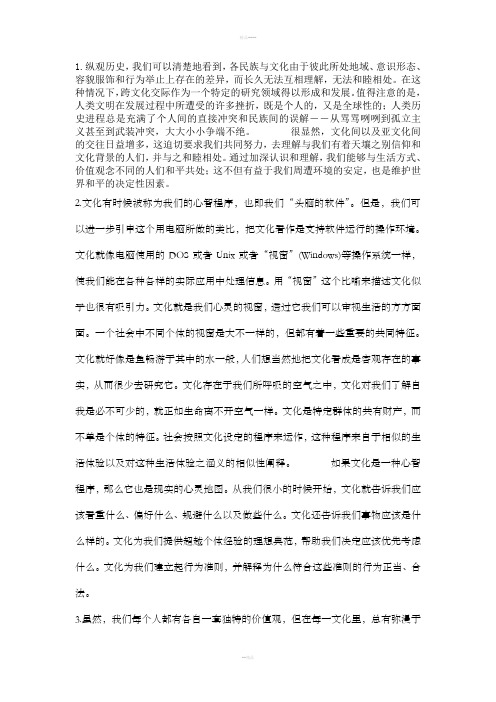
1.纵观历史,我们可以清楚地看到,各民族与文化由于彼此所处地域、意识形态、容貌服饰和行为举止上存在的差异,而长久无法互相理解,无法和睦相处。
在这种情况下,跨文化交际作为一个特定的研究领域得以形成和发展。
值得注意的是,人类文明在发展过程中所遭受的许多挫折,既是个人的,又是全球性的;人类历史进程总是充满了个人间的直接冲突和民族间的误解--从骂骂咧咧到孤立主义甚至到武装冲突,大大小小争端不绝。
很显然,文化间以及亚文化间的交往日益增多,这迫切要求我们共同努力,去理解与我们有着天壤之别信仰和文化背景的人们,并与之和睦相处。
通过加深认识和理解,我们能够与生活方式、价值观念不同的人们和平共处;这不但有益于我们周遭环境的安定,也是维护世界和平的决定性因素。
2.文化有时候被称为我们的心智程序,也即我们“头脑的软件”。
但是,我们可以进一步引申这个用电脑所做的类比,把文化看作是支持软件运行的操作环境。
文化就像电脑使用的DOS或者Unix或者“视窗”(Windows)等操作系统一样,使我们能在各种各样的实际应用中处理信息。
用“视窗”这个比喻来描述文化似乎也很有吸引力。
文化就是我们心灵的视窗,透过它我们可以审视生活的方方面面。
一个社会中不同个体的视窗是大不一样的,但都有着一些重要的共同特征。
文化就好像是鱼畅游于其中的水一般,人们想当然地把文化看成是客观存在的事实,从而很少去研究它。
文化存在于我们所呼吸的空气之中,文化对我们了解自我是必不可少的,就正如生命离不开空气一样。
文化是特定群体的共有财产,而不单是个体的特征。
社会按照文化设定的程序来运作,这种程序来自于相似的生活体验以及对这种生活体验之涵义的相似性阐释。
如果文化是一种心智程序,那么它也是现实的心灵地图。
从我们很小的时候开始,文化就告诉我们应该看重什么、偏好什么、规避什么以及做些什么。
文化还告诉我们事物应该是什么样的。
文化为我们提供超越个体经验的理想典范,帮助我们决定应该优先考虑什么。
跨文化交际unit课后translation中英对照
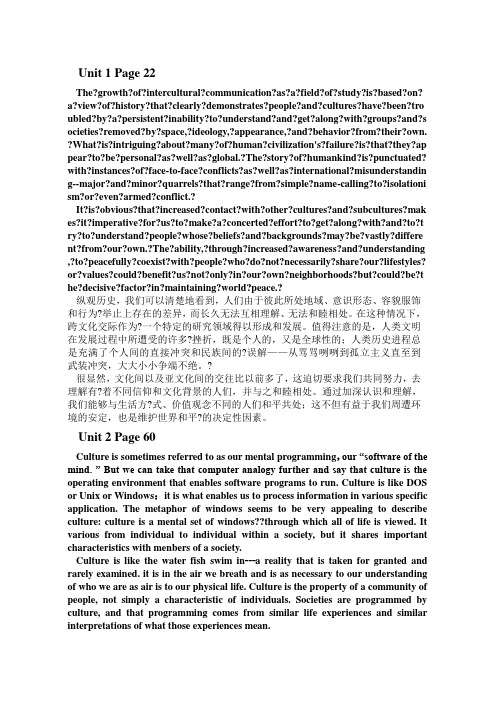
Unit 1 Page 22The?growth?of?intercultural?communication?as?a?field?of?study?is?based?on? a?view?of?history?that?clearly?demonstrates?people?and?cultures?have?been?tro ubled?by?a?persistent?inability?to?understand?and?get?along?with?groups?and?s ocieties?removed?by?space,?ideology,?appearance,?and?behavior?from?their?own. ?What?is?intriguing?about?many?of?human?civilization's?failure?is?that?they?ap pear?to?be?personal?as?well?as?global.?The?story?of?humankind?is?punctuated? with?instances?of?face-to-face?conflicts?as?well?as?international?misunderstandin g--major?and?minor?quarrels?that?range?from?simple?name-calling?to?isolationi sm?or?even?armed?conflict.?It?is?obvious?that?increased?contact?with?other?cultures?and?subcultures?mak es?it?imperative?for?us?to?make?a?concerted?effort?to?get?along?with?and?to?t ry?to?understand?people?whose?beliefs?and?backgrounds?may?be?vastly?differe nt?from?our?own.?The?ability,?through?increased?awareness?and?understanding ,?to?peacefully?coexist?with?people?who?do?not?necessarily?share?our?lifestyles? or?values?could?benefit?us?not?only?in?our?own?neighborhoods?but?could?be?t he?decisive?factor?in?maintaining?world?peace.?纵观历史,我们可以清楚地看到,人们由于彼此所处地域、意识形态、容貌服饰和行为?举止上存在的差异,而长久无法互相理解、无法和睦相处。
跨文化交际中英文化对比课文参考译文U1
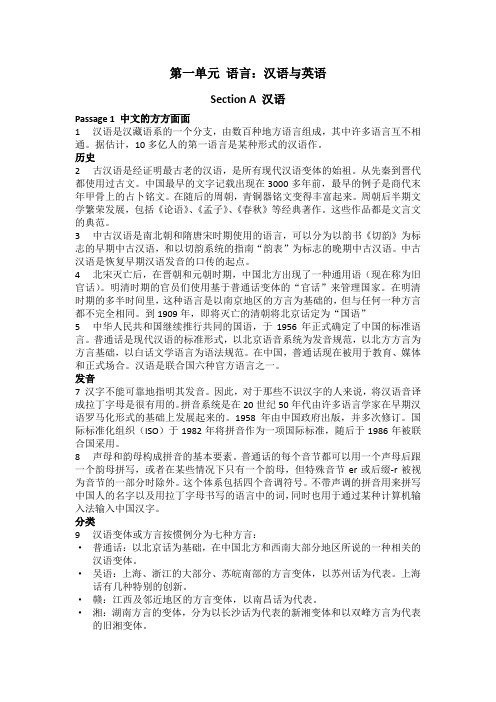
第一单元语言:汉语与英语Section A 汉语Passage 1 中文的方方面面1汉语是汉藏语系的一个分支,由数百种地方语言组成,其中许多语言互不相通。
据估计,10多亿人的第一语言是某种形式的汉语作。
历史2古汉语是经证明最古老的汉语,是所有现代汉语变体的始祖。
从先秦到晋代都使用过古文。
中国最早的文字记载出现在3000多年前,最早的例子是商代末年甲骨上的占卜铭文。
在随后的周朝,青铜器铭文变得丰富起来。
周朝后半期文学繁荣发展,包括《论语》、《孟子》、《春秋》等经典著作。
这些作品都是文言文的典范。
3中古汉语是南北朝和隋唐宋时期使用的语言,可以分为以韵书《切韵》为标志的早期中古汉语,和以切韵系统的指南“韵表”为标志的晚期中古汉语。
中古汉语是恢复早期汉语发音的口传的起点。
4北宋灭亡后,在晋朝和元朝时期,中国北方出现了一种通用语(现在称为旧官话)。
明清时期的官员们使用基于普通话变体的“官话”来管理国家。
在明清时期的多半时间里,这种语言是以南京地区的方言为基础的,但与任何一种方言都不完全相同。
到1909年,即将灭亡的清朝将北京话定为“国语”5中华人民共和国继续推行共同的国语,于1956年正式确定了中国的标准语言。
普通话是现代汉语的标准形式,以北京语音系统为发音规范,以北方方言为方言基础,以白话文学语言为语法规范。
在中国,普通话现在被用于教育、媒体和正式场合。
汉语是联合国六种官方语言之一。
发音7 汉字不能可靠地指明其发音。
因此,对于那些不识汉字的人来说,将汉语音译成拉丁字母是很有用的。
拼音系统是在20世纪50年代由许多语言学家在早期汉语罗马化形式的基础上发展起来的。
1958年由中国政府出版,并多次修订。
国际标准化组织(ISO)于1982年将拼音作为一项国际标准,随后于1986年被联合国采用。
8声母和韵母构成拼音的基本要素。
普通话的每个音节都可以用一个声母后跟一个韵母拼写,或者在某些情况下只有一个韵母,但特殊音节er或后缀-r被视为音节的一部分时除外。
跨文化交际翻译版
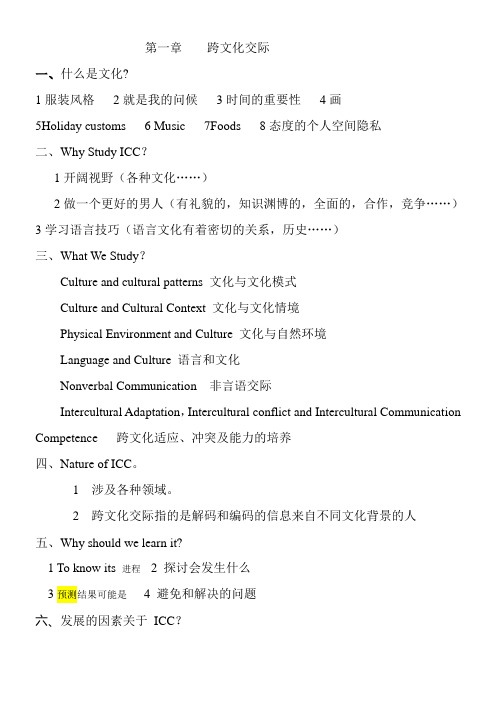
第一章跨文化交际一、什么是文化?1服装风格2就是我的问候3时间的重要性4画5Holiday customs 6 Music 7Foods 8态度的个人空间隐私二、Why Study ICC?1开阔视野(各种文化……)2做一个更好的男人(有礼貌的,知识渊博的,全面的,合作,竞争……)3学习语言技巧(语言文化有着密切的关系,历史……)三、What We Study?Culture and cultural patterns 文化与文化模式Culture and Cultural Context 文化与文化情境Physical Environment and Culture 文化与自然环境Language and Culture 语言和文化Nonverbal Communication 非言语交际Intercultural Adaptation,Intercultural conflict and Intercultural Communication Competence 跨文化适应、冲突及能力的培养四、Nature of ICC。
1 涉及各种领域。
2 跨文化交际指的是解码和编码的信息来自不同文化背景的人五、Why should we learn it?1 To know its 进程2 探讨会发生什么3预测结果可能是 4 避免和解决的问题六、发展的因素关于ICC?1技术发展 2 Globalization 全球化 3 人口迁移七、Globalization。
1 全球化的定义?2 戴安娜公主逝世.An English princess with an Egyptian boyfriend crashes in French tunnel, driving a German car with a Dutch engine, driven by a Belgian (比利时人) who was drunk on Scottish whisky, followed closely by Italian Paparazzi, on Japanese motorcycles; treated by an American doctor, using Brazilian Medicine.英国公主与埃及男友坠毁在法国的隧道,驾驶一辆德国汽车与发动机驱动的荷兰,比利时(比利时人)谁喝苏格兰威士忌,紧随其后的是意大利狗仔队,日本摩托车;治疗的美国医生使用药物,巴西。
新编跨文化交际英语教程1-6单元翻译(Word可编辑版)

纵观历史,我们可以清楚地看到,人们由于彼此所处地域、意识形态、容貌服饰和行为举止上存在的差异,而长久无法互相理解、无法和睦相处。
在这种情况下,跨文化交际作为一个特定的研究领域得以形成和发展。
值得注意的是, 人类文明在发展过程中所遭受的许多挫折, 既是个人的, 又是全球性的: 人类历史进程总是充满了个人问的直接冲突和民族间的误解一一从骂骂咧咧到孤立主义直至到武装冲突, 大大小小争端不绝。
很显然, 文化间以及亚文化问的交往比以前多了, 这迫切要求我们共同努力, 去理解有着不同信仰和文化背景的人们, 并与之和睦相处。
通过加深认识和理解, 我们能够与生活方式、价值观念不同的人们和平共处: 这不但有益于我们周遭环境的安定, 也是维护世界和平的决定性因素。
Translation Unit 2文化有时候被称为我们的心智程序, 我们“头脑的软件”。
但是, 我们可以进一步引中这个用电脑所做的类比, 把文化看作是支持运行的操作环境。
文化就像电脑使用的Dos 或者unix 或者“视窗”(windows) 等操作系统一样, 使我们能在各种各样的实际应用中处理信息。
用“视窗”这个比喻来描述文化似乎也很有吸引力。
文化就是我们心灵的视窗,透过它我们审视生活的方方面面。
一个社会中不同个体的视窗是不大一样的, 但都有着一些重要的共同特征。
文化就好像是鱼畅游于其中的水一般, 人们想当然地把文化看成是客观存在的事实, 因而很少去研究它。
文化存在于我们所呼吸的空气之中, 文化对于我们了解我们自身之为何物是必不可少的, 就正如生命离不开空气一样。
文化是特定群体的共有财产, 而不单是个体的特征。
社会按照文化设定的程序运作, 这种程序来自于相似的生活体验以及对这种生活体验之含义的相似阐释。
如果文化是一种心智程序, 那么它也是现实的心灵地图。
从我们很小的时候开始, 文化就告诉我们应该看重什么、偏好什么、规避什么和做些什么, 文化还告诉我们事物应该是什么样。
新编跨文化交际英语教程1~7单元翻译
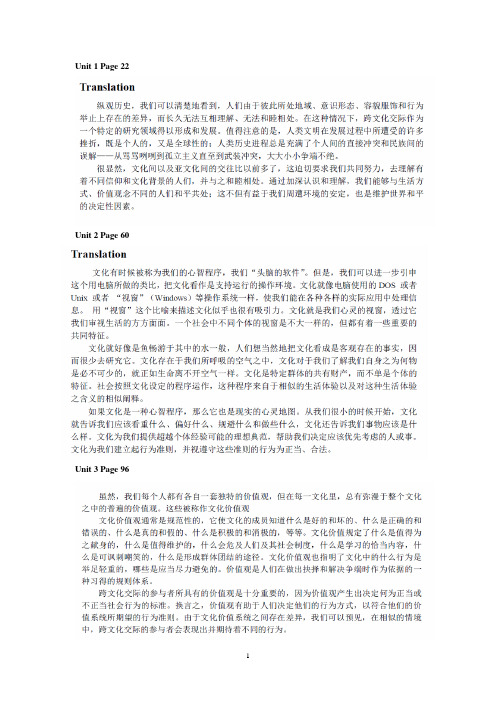
Unit 2 Page 60 Unit 3 Page 96Unit 5 Page 175 Unit 6 Page 215Case 2A common cultural misunderstanding in classes involves conflicts between what is said to be direct communication style and indirect communication style. In American culture, people tend to say what is on their minds and to mean what they say. Therefore, students in class are expected to ask questions when they need clarification. Mexican culture shares this preference of style with American culture in some situations, and that‘s why the students from Mexico readily adopted the techniques of asking questions in class. However, Korean people generally prefer indirect communication style, and therefore they tend to not say what is on their minds and to rely more on implications and inference, so as to be polite and respectful and avoid losing face through any improper verbal behavior. As is mentioned in the case, to many Koreans, numerous questions would show a disrespect for the teacher, and would also reflect that the student has not studied hard enough.Case 3The conflict here is a difference in cultural values and beliefs. In the beginning, Mary didn’t realize that her Dominican sister saw her as a member of the family, literally. In the Dominican view, family possessions are shared by everyone of the family. Luz was acting as most Dominican sisters would do in borrowing without asking every time. Once Mary understood that there was a different way of looking at this, she would become more accepting. However, she might still experience the same frustration when this happened again. She had to find ways to cope with her own emotional cultural reaction as well as her practical problem (the batteries running out).Case 6When a speaker says something to a hearer, there are at least three kinds ofmeanings involved: utterance meaning, speaker’s meaning and hearer’s meaning. In the dialogue, when Litz said ‘How long is she going to stay?’ she meant to say that if she knew how long her mother-in-law was going to stay in Finland, she would be able to make proper arrangements for her, such as taking her out to do some sightseeing. However, her mother-in-law overheard the conversation, and took Litz’s question to mean “Litz does not want me to stay for long”. From the Chinese point of view, it seems to be inappropriate for Litz to ask such a question just two days after her mother-in-law’s arrival. If she feels she has to ask the question, it would be better to ask some time later and she should not let her mother-in-law hear it.Case 7Keiko insists on giving valuable gifts to her college friends, because in countries like Japan, exchanging gifts is a strongly rooted social tradition. Should you receive a gift, and don’t have one to offer in return, you will probably create a crisis. If not as serious as a crisis, one who doesn’t offer a gift in return may be considered rude or impolite. Therefore, in Japan, gifts are a symbolic way to show appreciation, respect, gratitude and further relationship.Keiko obviously has taken those used items from Mary, Ed and Marion as gifts, for she probably doesn’t know that Americans frequently donate their used household items to church or to the community. Mary, Ed and Marion would never consider those used household items given to Keiko as gifts. No wonder they felt very uncomfortable when they received valuable gifts in return.Case 10In Japan, a company is often very much like a big family, in which the manger(s) will take good care of the employees and the employees are expected to devote themselves to the development of the company and, if it is necessary, to sacrifice their own individual interests for the interests of the company, from which, in the long run, the employees will benefit greatly. But for the French, a company is just a loosely- knit social organization wherein individuals are supposed to take care of themselves and their families. Moreover, the way the French make decisions in the family might also be different from the typical Japanese one, which may not often involve females and the power to decide usually lies with the dominating male. As there are such cultural differences between the Japanese and the French, Mr. Legrand’s decision made Mr. Tanaka feel dumbfounded.Case 12In this case, it seems that the Chinese expectations were not fulfilled. First, having two people sharing host responsibilities could be somewhat confusing to the hierarchically minded Chinese. Second, because age is often viewed as an indication of seniority, the Chinese might have considered the youth of their Canadian hosts as slight to their own status. Third, in China, it is traditional for the host to offer a welcome toast at the beginning of the meal, which is the reciprocated by the guests; by not doing so, the Canadian might be thought rude. The abrupt departure of the Chinese following the banquet was probably an indication that they were not pleased with the way they were treated. The Canadians’ lack of understanding of the Chinese culture and the Chinese ways of communication clearly cost them in their business dealings with the visiting delegation.Case 17When these two men separate, they may leave each other with very different impressions.Mr Richardson is very pleased to have made the acquaintance of Mr Chu and feels they have gotten off to a very good start. They have established their relationship on a first-name basis and Mr Chu’s smile seemed to indicate that he will be friendly and easy to do business with. Mr Richardson is particularly pleased that he had treated Mr Chu with respect for his Chinese background by calling him Hon-fai rather than using the western name, David, which seemed to him an unnecessary imposition of western culture.In contrast, Mr Chu feels quite uncomfortable with Mr Richardson. He feels it will be difficult to work with him, and that Mr Richardson might be rather insensitive to cultural differences. He is particularly bothered that, instead of calling him David or Mr Chu, Mr Richardson used his given name, Hon-fai, the name rarely used by anyone, in fact. It was this embarrassment which caused him to smile. He would feel more comfortable if they called each other Mr Chu and Mr Richardson. Nevertheless, when he was away at school in North America he learned that Americans feel uncomfortable calling people Mr for any extended period of time. His solution was to adopt a western name. He chose David for use in such situations.Case 19Talking about what’s wrong is not easy for people in any culture, but people in high-context countries like China put high priority on keeping harmony, preventing anyone from losing face, and nurturing the relationship. It seems that Ron Kelly had to learn a different way of sending message when he was in China. At home in Canada he would have gone directly to the point. But in China, going directly to the problem with someone may suggest that he or she has failed to live up to his or her responsibility and the honor of his or her organization is in question. In high-context cultures like China, such a message is serious and damaging. In low-context cultures, however, the tendency is just to “spit it out”, to get it into words and worry about the result later. Senders of unwelcome messages use objective facts, assuming, as with persuasion, that facts are neutral, instrumental, and impersonal. Indirectness is often the way members of high-context cultures choose to communicate about a problem. Case 21Sometimes our best intentions can lead to breakdowns (故障)in cross-cultural communication. For example, one of the very common manners of touching --- handshaking --- may result in conflict when performed with no consideration of cultural differences. Among middle-class North American men, it is customary to shake hands as a gesture of friendship. When wanting to communicate extra friendliness, a male in the United States may, while shaking hands, grasp with his left hand his friend’s right arm. However, to people of Middle Eastern countries, the left hand is profane (亵渎的) and touching someone with it is highly offensive. Therefore, in Vernon’s eyes, Kenneth was actually an extremely offensive message to him. Case 22In Puerto Rican culture, as in some other Latin American and Eastern cultures, it is not right for a child to keep an eye-contact with an adult who is accusing him or her, while in the United States, failing of meeting other person’s eye accusing him or her would be taken as a sign of guiltiness. As the principal knew little about this cultural difference in using eye-contact, he decided that the girl must be guilty. Generallyspeaking, avoiding eye-contact with the other(s) is often considered as an insult in some cultures, but may signify respect for authority and obedience in other cultures. Case 25For people from the American culture and western European cultures, one’s time should be scheduled into segments or compartments which are to be kept discrete from one another. They prefer to do one thing at a time. They will be annoyed when they have made an appointment with somebody, only to find a lot of other things going on at the same time. They don’t like to interrupt others and be interrupted by other while they are doing something. In contrast, people from many other cultures including the Chinese culture are more likely to operate with several people, ideas, or matters simultaneously. They are more easily distracted and subject to interruptions, which they would not usually mind very much. The miscommunication between Katherine and the director can be ascribed to their lack of knowledge about each other’s way of using time.In this case, to the Chinese director as well as many other Chinese people, it is natural to handle the other things which needed to be dealt with immediately. He may have thought that, in this way, he utilized the time best. But to Katherine and most Westerners, it’s quite different. They tend to do things strictly according to their schedule and appointments with others, which is their concept of using time best.高语境交流和低语境交流(由高到低排列)Japanese, Chinese, Korean, African American, Native American, Arab, Greek, Latin,Italian,English,Frech,Amercian,Scandinavian,German,German-Swiss。
新编跨文化交际英语教程(许力生)课后翻译
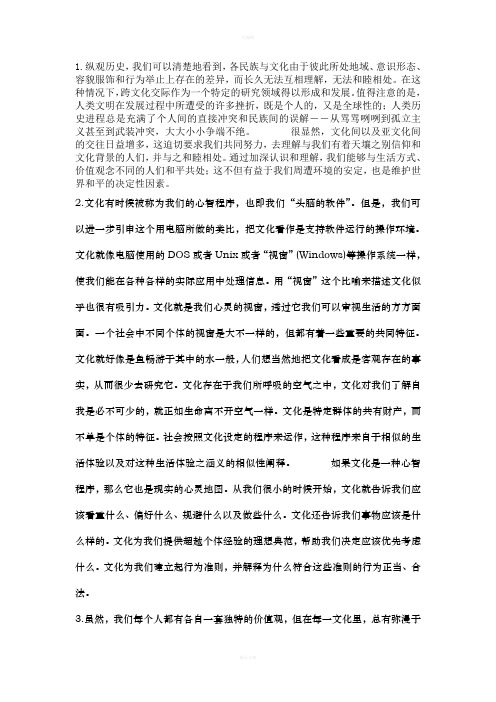
1.纵观历史,我们可以清楚地看到,各民族与文化由于彼此所处地域、意识形态、容貌服饰和行为举止上存在的差异,而长久无法互相理解,无法和睦相处。
在这种情况下,跨文化交际作为一个特定的研究领域得以形成和发展。
值得注意的是,人类文明在发展过程中所遭受的许多挫折,既是个人的,又是全球性的;人类历史进程总是充满了个人间的直接冲突和民族间的误解--从骂骂咧咧到孤立主义甚至到武装冲突,大大小小争端不绝。
很显然,文化间以及亚文化间的交往日益增多,这迫切要求我们共同努力,去理解与我们有着天壤之别信仰和文化背景的人们,并与之和睦相处。
通过加深认识和理解,我们能够与生活方式、价值观念不同的人们和平共处;这不但有益于我们周遭环境的安定,也是维护世界和平的决定性因素。
2.文化有时候被称为我们的心智程序,也即我们“头脑的软件”。
但是,我们可以进一步引申这个用电脑所做的类比,把文化看作是支持软件运行的操作环境。
文化就像电脑使用的DOS或者Unix或者“视窗”(Windows)等操作系统一样,使我们能在各种各样的实际应用中处理信息。
用“视窗”这个比喻来描述文化似乎也很有吸引力。
文化就是我们心灵的视窗,透过它我们可以审视生活的方方面面。
一个社会中不同个体的视窗是大不一样的,但都有着一些重要的共同特征。
文化就好像是鱼畅游于其中的水一般,人们想当然地把文化看成是客观存在的事实,从而很少去研究它。
文化存在于我们所呼吸的空气之中,文化对我们了解自我是必不可少的,就正如生命离不开空气一样。
文化是特定群体的共有财产,而不单是个体的特征。
社会按照文化设定的程序来运作,这种程序来自于相似的生活体验以及对这种生活体验之涵义的相似性阐释。
如果文化是一种心智程序,那么它也是现实的心灵地图。
从我们很小的时候开始,文化就告诉我们应该看重什么、偏好什么、规避什么以及做些什么。
文化还告诉我们事物应该是什么样的。
文化为我们提供超越个体经验的理想典范,帮助我们决定应该优先考虑什么。
- 1、下载文档前请自行甄别文档内容的完整性,平台不提供额外的编辑、内容补充、找答案等附加服务。
- 2、"仅部分预览"的文档,不可在线预览部分如存在完整性等问题,可反馈申请退款(可完整预览的文档不适用该条件!)。
- 3、如文档侵犯您的权益,请联系客服反馈,我们会尽快为您处理(人工客服工作时间:9:00-18:30)。
Unit 1 Page 22The growth of intercultural communication as a field of stud y is based on a view of history that clearly demonstrates pe ople and cultures have been troubled by a persistent inability to understand and get along with groups and societies remove d by space, ideology, appearance, and behavior from their own.What is intriguing about many of human civilization's failure is that they appear to be personal as well as global. The story of humankind is punctuated with instances of face-to-fa ce conflicts as well as international misunderstanding--major an d minor quarrels that range from simple name-calling to isolat ionism or even armed conflict.It is obvious that increased contact with other cultures and subcultures makes it imperative for us to make a concerted effort to get along with and to try to understand people who se beliefs and backgrounds may be vastly different from our o wn. The ability, through increased awareness and understanding, to peacefully coexist with people who do not necessarily sha re our lifestyles or values could benefit us not only in our own neighborhoods but could be the decisive factor in mainta ining world peace.纵观历史,我们可以清楚地看到,人们由于彼此所处地域、意识形态、容貌服饰和行为举止上存在的差异,而长久无法互相理解、无法和睦相处。
在这种情况下,跨文化交际作为一个特定的研究领域得以形成和发展。
值得注意的是,人类文明在发展过程中所遭受的许多挫折,既是个人的,又是全球性的;人类历史进程总是充满了个人间的直接冲突和民族间的误解——从骂骂咧咧到孤立主义直至到武装冲突,大大小小争端不绝。
很显然,文化间以及亚文化间的交往比以前多了,这迫切要求我们共同努力,去理解有着不同信仰和文化背景的人们,并与之和睦相处。
通过加深认识和理解,我们能够与生活方式、价值观念不同的人们和平共处;这不但有益于我们周遭环境的安定,也是维护世界和平的决定性因素。
Unit 2 Page 60Culture is sometimes referred to as our mental programming,our “software of the mind. ” But we can take that computer analogy further and say that culture is the operating environment that enables software programs to run. Culture is like DOS or Unix or Windows:it is what enables us to process information in various specific application. The metaphor of windows seems to be very appealing to describe culture: culture is a mental set of windows through which all of life is viewed. It various from individual to individual within a society, but it shares important characteristics with menbers of a society.Culture is like the water fish swim in┄a reality that is taken for grantedand rarely examined. it is in the air we breath and is as necessary to our understanding of who we are as air is to our physical life. Culture is the property of a community of people, not simply a characteristic of individuals. Societies are programmed by culture, and that programming comes from similar life experiences and similar interpretations of what those experiences mean.If culture is mental programming, it is also a mental map of reality. It tells us from early childhood what matters, what to prefer, what to avoid, and what to do. Culture also tells us what ought to be. It gives us assumptions about the ideal beyond what individuals may experience. It helps us in sitting priorities. It establishes codes for behavior and provides justification and legitimization for that behavior.文化有时候被称为我们的心智程序,我们“头脑的软件”。
但是,我们可以进一步引申这个用电脑所做的类比,把文化看作是支持运行的操作环境。
文化就像电脑使用的DOS 或者Unix 或者“视窗”(Windows)等操作系统一样,使我们能在各种各样的实际应用中处理信息。
用“视窗”这个比喻来描述文化似乎也很有吸引力。
文化就是我们心灵的视窗,透过它我们审视生活的方方面面。
一个社会中不同个体的视窗是不大一样的,但都有着一些重要的共同特征。
文化就好像是鱼畅游于其中的水一般,人们想当然地把文化看成是客观存在的事实,因而很少去研究它。
文化存在于我们所呼吸的空气之中,文化对于我们了解我们自身之为何物是必不可少的,就正如生命离不开空气一样。
文化是特定群体的共有财产,而不单是个体的特征。
社会按照文化设定的程序运作,这种程序来自于相似的生活体验以及对这种生活体验之含义的相似阐释。
如果文化是一种心智程序,那么它也是现实的心灵地图。
从我们很小的时候开始,文化就告诉我们应该看重什么、偏好什么、规避什么和做些什么,文化还告诉我们事物应该是什么样。
文化为我们提供超越个体经验可能的理想典范,帮助我们决定应该优先考虑的人或事。
文化为我们建立起行为准则,并视遵守这些准则的行为为正当、合法。
Unit 3 Page 96Although each of us has a unique set of values, there also are values that tend to permeate a culture. These are called cultural values.Cultural values generally are normative in that they inform a member ofa culture what is good and bad, right and wrong, true and false, positiveand negative, and the like. Culture values define what is worthwhile to die for, what is worth protecting, what frightens people and their social systems, what are considered proper subjects for study and for ridicule, and what types of events lead individuals to group solidarity. Culture values also specify what behaviors are of importance and which should be avoided within a culture. Values represent a learned organization of rules for making choices and for resolving conflicts.The values held by participants in intercultural communication are important because values develop standards and guidelines that establish appropriate and inappropriate behaviors in a society. Values, in otherwords, help determine how people ought to behave with the result that people will exhibit and expect behaviors according to their value systems. To the extent that culture value systems differ, we may expect that intercultural communication participants will tend to exhibit and to expect different behaviors under similar circumstances.虽然,我们每个人都有各自一套独特的价值观,但在每一文化里,总有弥漫于整个文化之中的普遍的价值观。
